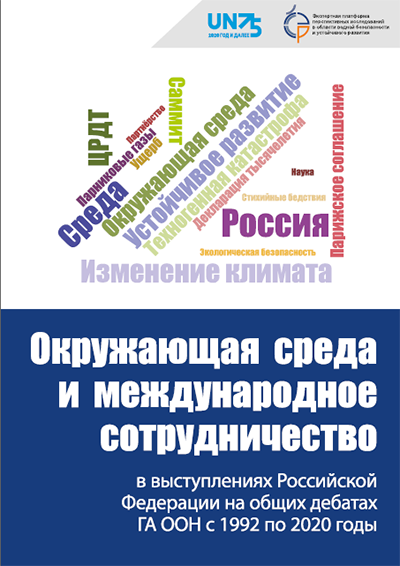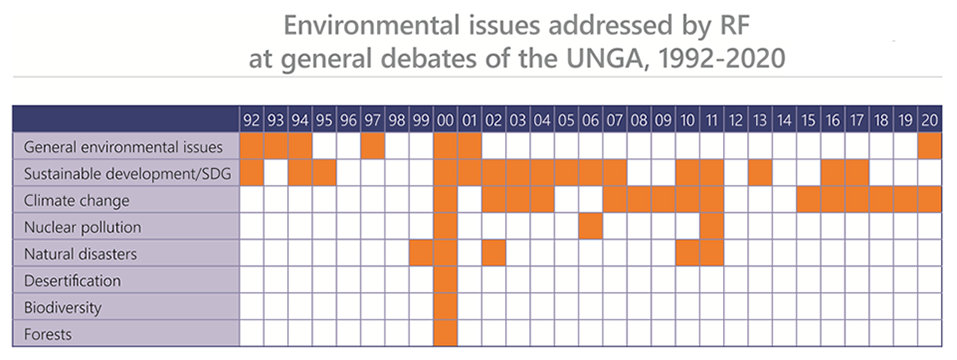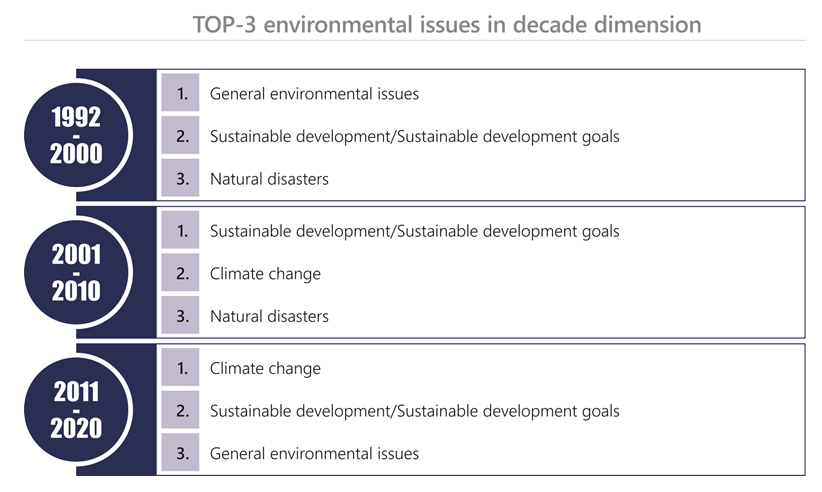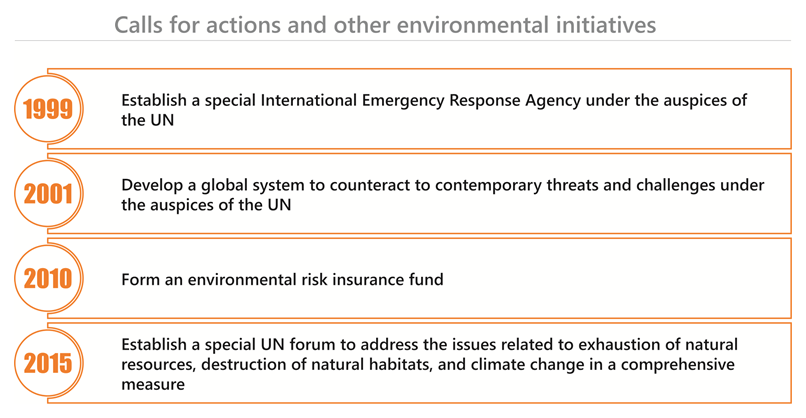Research
The Russian Federation at the UN General Assembly: Highlights on the Environmental Matters in 1992-2020
Authors: D. Ziganshina, A. Galustyan, D. Abasova
Experts contributed to the study: Prof. D.V. Kozlov,
Prof. N.B. Prokhorova, E.A. Simonov
Design: A. Degtyaryova
Prepared as part of the UNECE Project “Support to the Network of Russian Speaking Water Management Organizations” financed by the Government of the Russian Federation”
© UNECE, SIC ICWC, authors
On the occasion of the 75th anniversary of the United Nations, platform experts analyzed the statements made at the general debate of the UN General Assembly by the countries from Eastern Europe, Caucasus and Central Asia (EECCA) with focus on the environmental matters.
The objective of this study was to identify how frequently and in what way the EECCA countries addressed matters related to nature use, the environmental conservation and transboundary cooperation from the UN tribune.
A summary review of Russia’s statements on the environmental matters is given below.
The Russian Federation at the UN General Assembly: Highlights on the Environmental Matters in 1992-2020
[in Russian]
Download .pdf


The Russian Federation has regularly addressed the environmental and sustainable development problems at the UN General Assembly. The most discussed issues included those related to sustainable development, climate change, environmental conservation, and natural and man-induced disasters. Desertification, biodiversity and deforestation were mentioned once in the context of a need to enhance international cooperation under the UN’s umbrella. Russia raised the nuclear pollution issues in the context of the problem of radioactive wastes and the need to exclude the use of enriched uranium and pure plutonium (2000) and in light of the Fokusima-1 accident in Japan (2011). The issues related to water use and protection (Lake Baikal and the Caspian Sea), transboundary cooperation, air pollution, and green energy have been left uncovered in Russia’s speeches.



The Russian Federation put forward the following initiatives: establish a special International Emergency Response Agency under the auspices of the UN, which has been realized since 2006 in the form of the Central Emergency Response Fund; develop a global system to counteract to contemporary threats and challenges; and, form an environmental risk insurance fund.

At the same time, according to experts, Russia's statements on nature management, environmental protection, and transboundary cooperation have been voiced ‘modestly’ and were fragmented and decreased in time, despite its influential position among its closest neighbors, its scientific and methodological developments, its regulatory framework, and its experience in the use and protection of abundant forest, water, and mineral resources.
According to experts, among the main risks that threaten the region and the world are climate change and the increased frequency and strength of natural disasters. Being exposed to massive fires on natural territories and having experience in combating natural and anthropogenic disasters, Russia can use the political platform of the UNGA in strengthening regional and international cooperation to reduce these risks and propose developing integrated capacity to address these problems as part of climate adaptation.
Issues of importance to be addressed in Russia's future speeches should include those related to protection of atmospheric air and creation of a system of integrated carbon monitoring, development of a model for transition from resource-based economy to post-carbon path of development. Russia should promote discussion of the use and protection of mineral, forest and water resources, in particular with regard to the Caspian Sea, Baikal, the shelf zone of Kamchatka and Sakhalin. It would be advisable to raise the issue of extensive measures for conservation and restoration of forests and their protective and habitat-forming functions. Despite the fact that once one of the most developed systems of conservation area management is deteriorating, Russia can still take a leading role in biodiversity protection and promote this in the UN. Russia also has succeeded in transboundary river basin management and could promote cooperation on transboundary water protection and use at the UNGA level, as it already does at the UNECE level.
 Prof. D.V. Kozlov:
Prof. D.V. Kozlov:
“…No one is aware better than Russia of the main risk that threatens the world as a whole and the Eurasian continent in particular: the problem of climate change and the increased frequency and strength of natural disasters. We need to talk about this constantly, not limiting by the UNGA platform only …”
 Prof. N.B. Prokhorova:
Prof. N.B. Prokhorova:
“Today, one of the main challenges before Russia is ecology. This is related to its vast territory and abundance of natural resources, as well as availability of man-unaffected regions. In light of this, Russia’s statements and environmental activity can be assessed as ‘modest’. This is particularly related to transboundary cooperation.”
 E.A. Simonov:
E.A. Simonov:
“Generally, Russia has built quite a reputation and more or less succeeded in transboundary river basin management and could promote cooperation on transboundary water protection and use at the UNGA level, as it already does at the UNECE level.”
